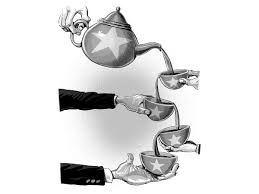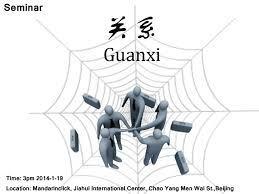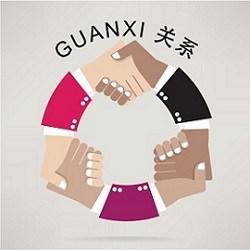
We climbed the three stories to a small room, packed with ‘foreigners,’ of all shapes and sizes, each one of us eager to get the green light to stay in China.
But unfortunately, there’s nothing eager about the pace with which we’re given the chop. (China’s regularly used word for the official stamp that certifies just about everything.)
People are waiting idly for hours on the straight-backed, sea green Formica chairs, gazing into space, while a bored Ava attempts to cartwheel across the floor.
Then without warning, we’re ushered over to the desk manned by staff in navy police-like uniforms.
It’s our turn. The Chinese woman who’s helping us from the hotel, insists we just need to smile brightly at the head boss when she comes out and we’ll be issued our visa.

She’s right. A few ‘Ni hao’s and gummy grins’ later we’re successfully chopped.
Turns out we’ve got ‘Guan xi’ and that has helped us get ahead of the pack.
Translated into English, Guan xi means connections or relationships.
And despite being introduced in times long ago when Emperors ruled China, it’s a concept that is alive and well in China’s 21stcentury.
Why Giving Cash for Favours is Par for the Course in China.
Embedded in society from the ground up, good guanxi is used by everyone from the average Chinese person in the street to any government official.
In fact, many will say, having ‘good guanxi’ is crucial to success in the developing nation of 1.4 billion people, especially when it’s still very much, survival of the fittest.
Desperate to get your child into a good school? You’re probably going to need to give guanxi to the principal or school owners. Want your child to get top marks, a little Guanxi with the teacher won’t hurt.
Want police to patrol an event you’re having? I.e. your hotel is putting on an event in the ballroom, well the police may just ask you to give guanxi in the form of fifty complimentary buffet vouchers or a free room night…because, you know.
And if you need surgery and want the doctor to perform at his very best on the day, you know not just give a mediocre performance, you’re most likely going to have to show some guanxi for that, too.

Guanxi is often misunderstood as being a relationship between two people, but in China, it’s a web of relations, a circle of influence, if you like, where someone in the circle is called on to help someone else, even if they’re not direct friends. Say for example, you’re pregnant and want to get into one of the better hospitals, perhaps you know someone who knows the head Obstetrician there. You can give your friend some guanxi and some for him to give to the Obstetrician in question and voila!
The concept of ‘face’ (another story for another day) helps to maintain trust and social order through the networks of guanxi, because, if favours are taken advantage of and not returned, the offender will lose face with all members of the network they’re in, which for a Chinese person could be disastrous.
As a BBC documentary put it:
“Guanxi is thoughts and communication, but at the end of the day, it’s actions. It’s really like (being) the first person to put money in the bank. And it may be saying something nice, it may be doing something out of your way, and it may be when you’re in a deal together, you make sure you don’t take the last dollar off the table. The actions that you do, they mean even more than words and thoughts.”
It’s not too far from that old adage we like to churn out in the West: ‘It’s not what you know it’s who you know’.
The difference being guanxi connections often involve the exchange of cash for a favour.
I distinctly remember a particular hotelier and some of his employees being given a ‘hairy crab’ as a gift from a new business associate. Not so unusual during hairy crab season, but on top of the hotelier’s chiller box, an envelope with $2000 cash.
For the record, he didn’t accept it.
One expat who’s been in China for 20 years puts it succinctly, “Guanxi is not what it used to be, there used to be real relationships, no benefits, you were doing a favour, there was no monetary transaction. When you pay money, it becomes corruption.”
And, this is where, somewhere along the way, lines have become blurred.
When does normal everyday guanxi become corruption?
Current president Xi Jin Ping is trying to stamp out corruption from the top down and generally politicians aren’t allowed to accept anything from anyone, not even a buffet dinner!
We’ve seen politicians of all political persuasions in Australia come under fire in recent years for accepting cash from Chinese businessmen, in exchange for secret meetings and special treatment.
Rightly or wrongly, giving money to influence an outcome is par for the course in China, and before doing any deal with China, it pays to understand the beast that is Guanxi.
While money is one aspect of today’s guanxi, it’s much more than that, it’s social currency.
In Chinese business, it can take years to build up the levels of trust required to be successful. It takes many many meetings (aka lunches) with your business partners, where you’re not actually talking business, at all and wonder if you’re ever going to get anywhere.
It’s also about giving the right guanxi, which is often a thoughtful gift over direct cash which can be seen as unsavoury.
Whichever way you use guanxi, know that at some stage you may be called on to return the favour.
I know of one story where a man picked up the daughter of a successful businessman from school every Friday and fed her dinner for a year, all in an effort to ‘curry favour’ for the future.

There’s a saying in China, ‘With guanxi, nothing matters, without guanxi, everything matters.’
This is China.

